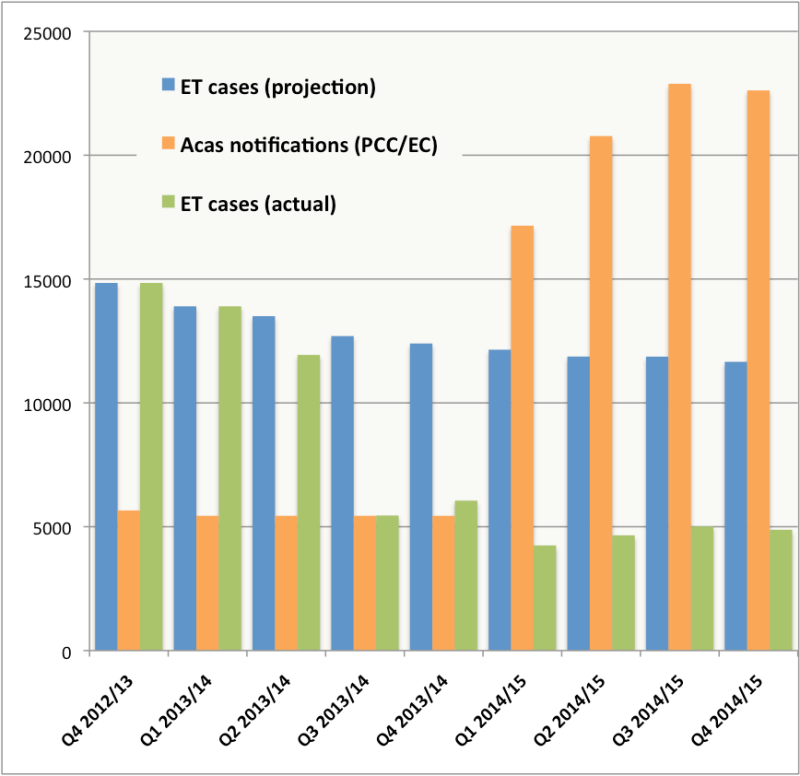One variant of the phrase usually (but erroneously) attributed to Mark Twain is that there are liars, damned liars and experts. Which is fine with me, because I claim no expertise in anything. So the first thing that struck me this morning, when casting an eye over the latest early conciliation statistics and independent evaluation report released by Acas, is that the good people in Euston Tower happily describe themselves as the “workplace expert”.
Not that I dispute that description, and it’s probably worth stating at the outset that, like most people with an interest in workplace dispute resolution, I welcomed and supported the evolution of the early conciliation regime provided for in sections 7 to 10 of the Enterprise & Regulatory Reform Act 2013 from the pre-existing, Acas pre-claim conciliation service. An employment tribunal claim should always be a remedy of last resort, and any provision by the State to help resolve disputes without recourse to a time-consuming, stressful and costly tribunal claim is to be welcomed. So I’m glad that, 12 months after implementation of the early conciliation regime, Acas feels able to proclaim the regime a “success, with high take-up and satisfaction rates”.
However (go fish, Mr Gove), the second thing that struck me this morning was the high number of early conciliation notifications (or ‘cases’) over the first year of operation – 83,423 – relative to the number of tribunal cases over the same period and, indeed, in previous years. In 2012-13, the last full year before the introduction of fees in July 2013, there were just 60,040 tribunal cases (single claims/cases + multiple claimant cases).
So – in a desperate and probably doomed attempt to keep Gem Reucroft happy – I have put the quarterly Acas figures into the following chart. The green columns show the actual number of tribunal cases (single claims/cases + multiple claimant cases), while the blue columns show my projection of the number of tribunal cases we could have expected, had both fees and ‘mandatory’ early conciliation by Acas not been introduced. As previously discussed on this blog, this assumes a continuation of the modest ‘historical downward trend’ in single claims/cases that started in 2010, and about which the Ministry of Injustice – having somehow failed to notice it in 2012 and 2013 – now has so much to say.
More controversially, perhaps, it also assumes that the sharp drop in multiple claimant cases in mid-2013 was largely coincidental to the introduction of fees, and simply reflects the slowing down (and confinement to Scotland) of what the Daily Mail would call The Equal Pay Claim Gravy Train. So it includes the actual number of multiple claimant cases.
Finally, the orange columns show: (a) the average number of Acas pre-claim conciliation referrals, in each quarter up to Quarter 4 of 2013-14 (as I can only find annual statistics); and (b) the number of early conciliation notifications (or ‘cases’) in each quarter since April 2014. And from this we can see that the number of early conciliation notifications far exceeds not just the actual number of tribunal cases, but also the number of tribunal cases we could have expected, had both fees and early conciliation not been introduced. Indeed, in each of the two most recent quarters, the number of notifications was almost twice the number of tribunal cases we could have expected.
From which we could perhaps conclude that Acas might well be hoovering up, and spending resources dealing with, a fair number of ‘disputes’ that would not have resulted in the issuing of a tribunal claim in any case. We probably need to take account of the number of voluntary pre-claim conciliation cases successfully resolved by Acas in the past before we do reach such a conclusion, but the chart suggests we may need to take a long, hard look at the assertion that the early conciliation regime introduced in April 2014 has been a “success”, at least in terms of reducing the number of tribunal cases (i.e. the principal aim of the policy).
Acas states that the independent evaluation research “found that nearly half of all claimants (48%) who used early conciliation either reached a formal settlement or were otherwise helped by Acas to avoid a tribunal claim”. But if that 48% figure is applied to the total number of notifications in the two most recent quarters (45,498), the resultant number of potential tribunal cases left over (23,659) is only marginally different to my projected number of tribunal cases over those two quarters (23,526), had fees (and early conciliation) not been introduced. In other words, take fees out of the picture, and the introduction of ‘mandatory’ early conciliation by Acas appears to have had little if any impact on the number of tribunal cases.
As noted by Darren Newman on Twitter (in response to the original version of this post), there is some evidence in the evaluation research report that Acas is indeed now hoovering up a significant number of cases that would not have resulted in a tribunal claim. The researchers found that one in four (24%) of claimants described their reason for making an EC notification as “being that they ‘Just wanted to see if a settlement could be reached, and did not have a desire to submit an employment tribunal claim'” (see page 33 of the report).
Anyway, not being an expert, I’ve probably missed something rather obvious here. So I await a gleeful email or direct message from Michael Reed, following which I will rewrite this post.

2 thoughts on “Lies, damn lies, and Acas statistics?”